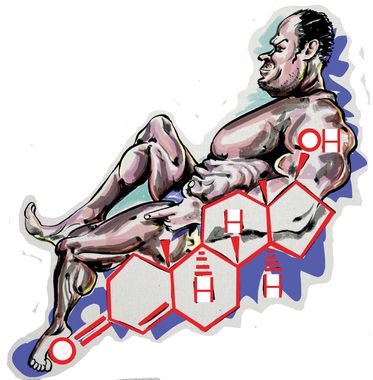Scientists at the University of Siena in Italy found that regular, early morning use of a light box similar to those used to combat Seasonal Affective Disorder helped men increase testosterone levels and improved their sex lives. Andrea Fagiolini, a professor who led the study and presented it at the European College of Neuropsychopharmacology conference in Vienna, said the treatment may prove useful during the northern hemisphere’s darker winter months.
“The increased levels of testosterone explain the greater reported sexual satisfaction,” he said. Low sexual desire can affect a significant number of men after age 40, with studies finding that up to 25 per cent of men report problems.
Why is testosterone important for a man? Because this is what makes a man 'a man'. It is not just the ’Y’ chromosome that is responsible for masculinity.

Testosterone is only one of the male hormones, but it is the most important. It begins to assert its complete control over a foetus in the womb. In week eight of pregnancy to be exact. Theoretically, the foetus could still go either way at this point. It can have sex structures like the labioscrotal swelling. But the Y chromosome has already caused the formation of a protein called H-Y antigen which has caused the gonads to become testicles. With the development of testicles comes the creation of Leydig’s cells, which produce testosterone.
From here on, testosterone calls the shots. In the next several weeks, it will make sure that the labioscrotal swelling becomes a scrotum, not the labia majora. It makes sure that the foetus gets a penis, not a clitoris, out of the same embryonic tissue. Likewise with all the internal sex organs, like the prostate.
Now comes the real mystery. Testosterone levels in male foetuses rise for a second time, towards the end of pregnancy and continues for the first two months after birth, before dropping back again until puberty. “Testosterone rides a roller coaster until birth,” is how University of California Los Angeles (UCLA) brain researcher Laura Allen describes it. “We don’t know what the second rise does, I suspect it makes the male brain different.”
Allen, her colleague Roger Gorski, and others at the UCLA School of Medicine have spent the last couple of decades examining both human and animal grey matter in an attempt to determine the differences between male and female brains, and the extent to which those differences can be matched with sexual orientation. They and others have been discovering parts of the brain that are different in men and women and alike in women and gay men. They talk of a “male brain” and a “female brain” the way we would talk of other body parts. And they expect that one day science will be able to correlate the differences in brain structure with larger differences in behaviour the way they can, right now, correlate hormones and behaviour in laboratory rats.
Gorski conducted experiments with rats. A male rat was deprived of testosterone and was given female hormones. At the same time a female rat was given testosterone. When placed together they acted contrary to their gender specific behaviour. The female rat mounted the male. Not only that, the male rat’s brain was like that of a female.
In women, production of oestrogen drops off precipitously after menopause, causing hot flashes and a number of other, fairly dramatic symptoms. In men, by contrast, the drop-off in hormones is so gradual that it doesn’t receive as much medical attention. In both men and women there is no sex drive without testosterone. Women who have had their ovaries or uteri removed in surgery are sometimes given testosterone supplements (in combination with oestrogen). Otherwise, their sex drive vanishes. Some physicians even prescribe testosterone supplementation for women who experience menopause and whose libidos inexplicably begin to flag in the process.






